- Will Lawyers In Canada Soon Face A Religious Test? The Hypersensitive Response Over Canada’s First Openly Christian Law School
- BC Law Society Approves TWU Law School Graduates
- The Cold Chill of the Legal Profession’s Rejection of Religious Freedom
- A Referendum On Religious Freedom
- Lawyers’ Referendum Not Just About TWU – It’s About Our Commitment To The Rule Of Law
- Called To Participate, But Not At The Table
- Hearing Update On Trinity Western University v. Nova Scotia Barristers’ Society
- Breaking News Supreme Court of Nova Scotia rules in favour of Trinity Western University …. more to come
- Space Enough For All: Nova Scotia Supreme Court Makes Decision on Trinity Western University Law School
- The Strange Case of Nova Scotia Barristers’ Society Appeal of the TWU Ruling
- CCCC Granted Intervener Status In TWU Case in British Columbia
- The Onward March of TWU: Next Step The Court of Appeal
- Trinity Western University and the Legal War of Attrition: Isn’t It Time To Let Diversity Flourish?
- Charitable Status of Un-Popular Opinion
- CCCC Denied Intervener Status at Ontario Court of Appeal
- CCCC Granted Intervener Status at the BC Court of Appeal on TWU Case
- Sending a Message to TWU: Your Graduates Need Not Apply
- Recent Happenings: CCCC Files Factum At BC Court of Appeal; Bussey appears on TV
- CCCC at the British Columbia Court of Appeal
- The Experts Demand Deference: Law Societies & TWU
- The Intolerance of Intolerance: The Outrageous Accusation That TWU’s School of Law Is Related To The Orlando Massacre
- Being On the Right Side of History: Where the Offended Take Away Religious Freedom
- Nova Scotia’s Highest Court Rules in Favour of TWU
- Common Sense Prevails at the Nova Scotia Court of Appeal
- Bussey on John Gormley Show
- Nova Scotia Barristers Society Will Not Appeal
- BC Court of Appeal On TWU
- Developing Story: BC Court of Appeal Rules 5-0 in favour of TWU
- The Decision That Has Changed Everything For TWU
- Law Society of BC Appeals TWU To Supreme Court of Canada
- Bussey in Vancouver Sun: Appeal court ruling on Trinity Western University is a game changer
- The Legal Revolution Against Religion
- Supreme Court Grants Leave On TWU
- Supreme Court Grants 9 But Denies 23 Groups Intervener Status In Landmark Case
- Canadian Council of Christian Charities Granted Intervener Status in TWU Case: The Supreme Court Changes Course On TWU Interveners
- Australian Group Interviews Bussey on Equality and Freedom of Religion
- Bruce Clemenger’s Video Message on TWU Case
- Oral Argument of CCCC on TWU at the Supreme Court of Canada
- June 15 TWU Decision To Be Released
- TWU Loses: Canada’s Religious Freedom Forever Altered
- The Constitutional Promise of Religious Freedom Betrayed
- TWU Drops Mandatory Community Covenant
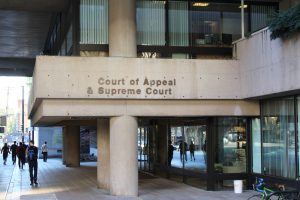
British Columbia Court of Appeal
As counsel for Canadian Council of Christian Charities, one of the interveners in the TWU case, I cannot but be pleased with the November 1 decision delivered by the British Columbia Court of Appeal. A 5-0 decision is significant, especially when you consider that the Court had the benefit of the Ontario Court of Appeal’s decision in June and the Nova Scotia Court of Appeal’s decision in July. The BC Court was able to consider both and analyze what it felt was the serious issues to be addressed in what I believe is the most important religious freedom case in Canada since Big M Drug Mart case in the 1980s.
I will not bore my readers with a deep legal analysis of the decision but I will run through some of the highlights so that you have a good grasp of what the Court said and why, I think, it is significant. I have also peppered my remarks with a very biased attitude in favour of TWU. I am very much an advocate for religious freedom in this country while also respecting the rights of others. If I sound rather strident it is because I am pushing back against what I consider to be some very unfair arguments against the religious community in Canada. I have stated it before and will do so again – we have to find the place where we can agree to disagree and still respect our mutual rights and obligations. The attempt to quash the TWU law school in my view was a bullying attempt to stifle difference on issues of fundamental concern. It is neither right nor just. It is gratifying to see a senior court in this country take seriously the issues involved and have the courage to stand for the legal right of a despised minority in our increasingly secular country. It is one thing to be secular, but if by “secular” we mean that there is only one view on matters of what it means to be human, then we will continue to have a serious problem in our polity going forward.
Background

You will recall that in June 2012 TWU applied to the Federation of Law Societies of Canada (FLSC) for accreditation for its proposed School of Law. The proposal was very innovative. It will focus on the actual practice of law so that when the students graduate they will have all the necessary skills to “hang their shingle” and begin work. This practical approach is something that will be a game changer for legal practise and legal education in Canada. The reality is all of the law schools in Canada are not so much focused on legal practice as they are on an academic legal education.
Speaking from experience, as a product of such education, I can tell you that my first day at a law office I had not a clue what I was to do. I literally had to be shown step by step what to do with filing documents in court and so on. Law school did not prepare me for the practice. However, it did prepare me to read case law, statutes, and law journals, and make arguments. But it did not teach me how to write – though there was some limited practical writing in law school.
Anyhow, all of that to say that what TWU is offering is unique and very much needed in Canada. If anything, TWU’s proposal may in fact be copied by some law schools because now they are more than aware of what TWU was proposing. It will be a shame if TWU does not get to have its law school, if for no other reason than, because of its ingenuity. With the BC Court of Appeal decision I do think TWU’s chances at the Supreme Court of Canada are greater than ever.
Back to our story. When TWU presented their proposal to the Federation a number of legal academics, all the law deans, and sexual equality activists rose up in opposition. This created a serious problem for the Federation. It had only just completed an arrangement with the law societies in Canada to be the vetting organization of new law schools. It was felt that it made more sense to have one organization review proposed law schools to ensure that they would meet the standards necessary to ensure that law graduates would be prepared for legal practice. Once the Federation gave its approval, a law society would be confident in accepting the Federation’s recommendation and not have to do worry about doing its own investigation of the new proposal. This worked well for Thompson Rivers in BC and Lakehead in Ontario. TWU upset the whole program. Suddenly there was a problem.
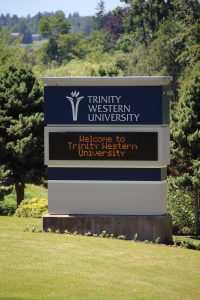
The problem resulted from TWU’s Community Covenant. The Covenant is the basic code of conduct expected of faculty and students on campus. Being a religious university this is an important requirement to maintain the religious ambiance. But what really got the ire of some members of the legal community was the stipulation that sexual intimacy was to be confined to the marriage relationship of one man and one woman. This was reminiscent of the 2001 battle over TWU’s education degree accreditation.
In 2001, the Supreme Court of Canada (SCC) decided that British Columbia College of Teachers (BCCT) had to accredit TWU’s education degree despite TWU’s Community Standards’ (that is what it was called at that time) prohibition against sexual relations outside of traditional marriage. That document specifically listed the prohibited sexual relations and used the term “homosexuality”. The SCC said that TWU was not for everybody and that there was no evidence of TWU education graduates discriminating against homosexual students when they taught in the public school system.
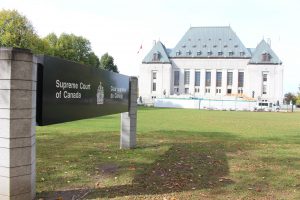
That 2001 decision has been a thorn in the flesh for a number of sexual equality activists ever since. Therefore, when TWU’s law school proposal came forward it was seen as a great opportunity for the courts to revisit the 2001 decision and ultimately have the SCC overturn it.
Academics argued that times have changed since 2001 and the courts would not accept the 2001 decision today — that the TWU Covenant was discriminatory against the LGBTQ community; that a religious university cannot be a safe environment for critical thinking; that a public body by accepting the accreditation of TWU was, in effect, endorsing TWU’s bigotry.
Letter campaigns, newspaper editorials, radio and TV programs, all pointed to a growing sense that the public and the legal community in particular were against TWU’s law school proposal as long as the Covenant remained.
Eventually the public pressure got to the point where the Federation set up a special Ad Hoc Committee to study these allegations against TWU. After some months the Committee decided in December 2013 that “there will be no public interest reason to exclude future graduates of the [TWU] program from law society bar admission programs.”
With the Federation approval, the provincial government of BC followed suit and approved the school.
TWU was off to the races, as it were. But it turned out to be the beginning of a long marathon that is not over yet. The argument from the academics now was that the Law Societies had a duty to independently review the TWU proposal themselves and not just accept the Federation’s recommendation. They had to show “courage.” It is rather interesting that the Federation’s recommendations were perfectly acceptable for Thompson Rivers and Lakehead but for TWU it was not up to the job. Robert Putman, the American sociologist says that when societies lose trust the economy fails. Consider the loss of trust that has occurred in this case. Rather than trust the Federation’s decision a number of law societies had their own investigations into TWU. More legal opinions were sought. More public hearings. More rancour. The opposition toward TWU was and is immense. I will be writing more on this point in the coming weeks. But in short it must have cost millions of dollars for the legal profession in Canada to have rejected its own Federation’s decision on TWU. It says something about where the power of influence is in this profession.
The rising chorus of opposition meant that the BC Law Society Benchers were feeling the heat of public pressure about TWU (and simultaneously so were the benchers in the other law societies). On February 28, 2014, the BC Benchers debated what to do. You can find a full run down of materials here. They provided opportunity for the public and professional input on the matter. Needless to say the public debate was intense. On April 11, 2014 the BC Benchers voted on a resolution to declare TWU’s Faculty of Law “not an approved faculty of law” despite the Federation’s decision. The Benchers requested a number of research questions be answered ahead of the meetings. One of those was a search of the Canadian law deans regarding “any trouble [that] they have had with Trinity Western graduates, in particular in the area of anti-gay activities.” Such was the low opinion of the Benchers of TWU and I suggest of religious people in general. It truly is shocking that such a request would even be thought to be necessary. But it reveals, again, the level of distrust the legal profession has towards the religious community. It is telling. As it turns out there was not one report of TWU graduates being involved in “anti-gay activities”! Now, I am curious what would be the report on other universities? But no other university would put up with a professional body making such a request of them. Can you imagine what the reaction of the University of Toronto or of York University would be if some professional body conducted an investigation on whether their graduates have been engaged in “anti-gay activities”? It is simply inconceivable. But a small Christian university is fair game for this type of treatment. It is unconscionable in my view and when this sordid affair is over and we have received the final word from the Supreme Court of Canada the legal profession has some fence mending to do with respect to its relationship with the Christian community because the attack against TWU is nothing less than an affront to the entire Christian world.
The BC Court of Appeal noted that the April 11, 2014 meeting showed evidence of a “conscientious consideration” of the motion and of the submissions it had received from the public. In the end 7 benchers voted for the motion and 20 voted against – therefore the Federation’s approval was accepted and TWU was accredited.
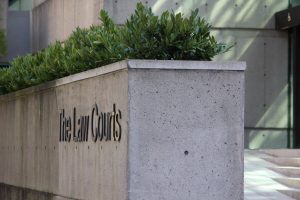
After that meeting there arose a strident opposition within the membership for a Special General Meeting to consider a motion calling on the Benchers to declare TWU not an approved faculty of law. That meeting was held on June 10, 2014 at 16 locations across BC. No doubt it was at tremendous expense to the membership However, expense is of little concern when the majority wishes to get rid of an unwanted minority. I was informed by some members who attended at one of the locations in the Vancouver area that they had mikes for or against the resolution they were voting on. So it just naturally ended up that everyone sat in accordance with the side their mike was on. It created an “us” and “them” atmosphere. Such logistics only exacerbated the carnival like mood as there was palpable tension in the air as those for and against spoke to the motion. In the end 3,210 members voted for the resolution and 968 voted against. The Benchers were now called upon to visit the issue again.
On September 26, 2014, the Benchers met to discuss the June resolution from the membership that called on them to reject TWU. They decided that a referendum of the full membership would be the way out of the impasse. The referendum results, they declared, would be binding (provided 1/3 of all members vote and 2/3 vote in favour of the resolution against TWU). They also voted, “The Benchers hereby determine that implementation of the Resolution does not constitute a breach of their statutory duties, regardless of the results of the Referendum.”
The Benchers were in essence “passing the buck” to the members. They were washing their hands of TWU’s fate. On April 11, 2014, they determined that their statutory duty to act in the public interest and properly balance the rights of religious freedom and the sexual equality rights went in favour of TWU. That is what took courage – to be on the side of constitutional protections in the face of public pressure to do otherwise. However, on September 26, 2014 they arrived at a rationalization that it matters not which side of the ledger they fall on as either side, in their view, would be somehow just. It would be just, in their view, if TWU is not accredited and it would be just if it is accredited. Justice could go either way on this one! That is an incredible decision when you think about it. How is it just for TWU not to have its law school because members of the profession are offended because of its religious belief and practice of marriage?
On October 30, 2014 the referendum results were 5,951 against TWU; 2,088 for TWU. 8,039 ballots cast and some 13,350 were entitled to vote.
The next day on October 31, 2014 the Benchers voted that TWU was not an approved law school. The public pressure against TWU had won the day. To be honest, it was a very sad day for the history of Canadian religious freedom. Despite the constitutional protections given to religious individuals and communities in the Charter; the long history of providing accommodation of religious beliefs from young boys being allowed to carry their kirpans to school to allowing religious people time off of work for their holy days, to protecting the right of unpopular religious groups such as Jehovah’s Witnesses in Quebec in the 1940s-1960s; all of this, and more, but we as a society could not protect a private religious school to maintain on its campus the religious belief and practice of marriage as one man and one woman? Adding insult to injury is the fact that this was conducted by a profession that has in its cradle the concern and care for human rights and constitutional protections as contained in the Charter.
There is little wonder, in my view that the BC Court of Appeal would make a 5-0 decision in this case. But I am getting a wee bit ahead of the story.
Naturally, Trinity Western University, applied for a judicial review of the October 31, 2014 decision of the BC Benchers.
On December 11, 2014 the Minister of Advanced Education decided that until the litigation is settled he withdrew the province’s consent to the TWU law school – “to protect the interests of prospective students….”
The other law societies addressed TWU as follows:
- Alberta – December 2013 stated that they had delegated to the Federation and accepted its approval;
- Saskatchewan – February 2014 – defeated a motion to revisit the Federation’s approval and therefore it accepts TWU;
- Ontario – April 24, 2014 – voted against TWU and won in both Ontario Courts – and is now facing appeal at the Supreme Court of Canada;
- Nova Scotia – April 25, 2014 voted against TWU but the Nova Scotia Barristers’ Society lost the judicial review in the Nova Scotia courts in July 2016 and therefore the Federation’s approval stands;
- Manitoba – May 2014 accepted the Federation’s approval;
- Newfoundland and Labrador – June 2014 is holding the question in abeyance;
- Yukon – Spring 2014 – accepted the Federation’s approval;
- New Brunswick – June 2014 accredited TWU.
Supreme Court of British Columbia
Chief Justice Hinkson ruled in 2015 that the Law Society unlawfully dedicated its decision-making powers to the members and fettered their discretion by being bound by the referendum results. In addition, the Law Society should have balanced their statutory obligations with the Charter values.
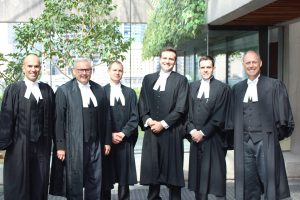
Lawyers for a number of interveners that supported TWU
Issues On The BC Court of Appeal
The court noted that there were four issues:
- Did the Law Society have statutory authority to refuse to approve TWU’s law school on the basis of an admissions policy?
- Did the Benchers unlawfully sub-delegate or fetter their decision-making authority?
- Was TWU denied procedural fairness?
- Does the Law Society’s decision reasonably balance the statutory objectives of the Legal Profession Act against the religious freedom rights of TWU?
The Courts answers:
- Did the Law Society have statutory authority to refuse to approve TWU’s law school on the basis of an admissions policy?
The Law Society had the authority to deny approval to a law faculty based on factors beyond the academic education being offered to students.
- Did the Benchers unlawfully sub-delegate or fetter their decision-making authority?
The Court decided that the Benchers were wrong in passing a resolution that they would be bound by the referendum regardless of the results and stating that either result was consistent with their duties. Administrative bodies, like the Law Society, have an obligation to properly balance the potential Charter infringements of their decisions against their statutory requirements. When done properly then the courts would defer to their wisdom.
The Anti-TWU group had argued that the Supreme Court of Canada in its Doré v. Barreau du Québec decision of 2012 gave administrative bodies the right to make up its own mind in balancing the Charter rights and their obligations. However, the BC Court of Appeal rejected that analysis and noted that a judicial review is still important to ensure that administrative bodies carried out their responsibilities correctly. The Court noted that such bodies would, naturally, be more concerned about its own “statutory regime” – its own responsibilities – at the expense of Charter values. It also pointed out that such bodies are vulnerable to public or government pressure and “may find it difficult to give Charter rights of unpopular persons or groups sufficient weight when balancing them against statutory objectives.”
That is, of course, what happened in this case. The BC Law Society was hijacked by responding to the public pressure against a very unpopular TWU and was willing to give TWU’s rights up to the discretion of a referendum.
The Doré case, said the Court, requires decisions of public bodies, like the Law Society, “to fall within the bounds of reasonableness.” If it fails to appreciate the significance of the Charter values then its decision will not be reasonable. You have to “balance the severity of the interference of the Charter protection with the statutory objectives.”

Lawyers for interveners at the BC Court of Appeal after receiving news their clients were accepted to intervene in the case.
By making the October 31, 2014 decision to be bound by the referendum the Benchers did not take into account how the Charter values could in this case best be protected in light of its obligations under the Legal Profession Act. To suggest, as the Law Society counsel did in argument before the court, that either result would have been accepted as reasonable was to confuse “the role to be played by an administrative tribunal and the role of the courts.”
The BC Court of appeal decided, in the circumstance, it could not defer to the decision of the Law Society not to approve TWU.
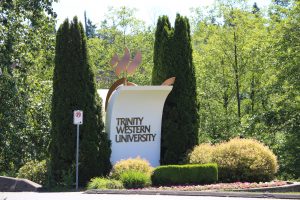
- Was TWU denied procedural fairness?
The Court did not feel that TWU was denied procedural fairness as there was ample debate on both sides of the issue and TWU knew what legal issues it had to address.
- Does the Law Society’s decision reasonably balance the statutory objectives of the Legal Profession Act against the religious freedom rights of TWU?
Religious Freedom
To establish an infringement of freedom of religion the law requires the claimant to establish the sincerity of belief of the religious doctrine. Second, the court has to determine whether an infringement has occurred. The BC Court had no problem recognizing that TWU is sincere in its teachings as contained in the Covenant.
Equality Right
The BC Court also recognized the conflicting Charter right of sexual equality is engaged. There was evidence that TWU’s admissions policy and Covenant would “perpetuate and exacerbate existing stigmatization and marginalization of LGBTQ persons.”
No Right is Absolute
Given that there are two rights at issue the Court was quick to point out that no right is absolute. Each has to be measured in relation to the other rights and the context in which the conflict arises. In this case, it is not a situation whether there is a direct conflict as would be the case if a person applied to TWU and was denied by TWU because of their refusal to sign the Covenant. Nor is this about the Law Society denying a Christian from practicing law. Instead, it is a situation where a statutory body bars Christians who choose to attend TWU law school by preventing the school from opening.
Role of Decision-Maker Regarding Charter Rights
The BC Court reviewed the jurisprudence in the Doré and the Loyola High School cases of the Supreme Court of Canada which outlines the responsibility of the Law Society in coming to a decision in this matter. The decision-maker is to balance the competing rights and not limit a right unreasonably in light of their statutory objectives. It is not the role of administrative bodies to favour one religious practice over another. “Because it allows communities with different values and practices to peacefully co-exist, a secular state also supports pluralism.” (Loyola).
The question then is: “did the decision of the Law Society not to approve TWU’s faculty of law interfere with freedom of religion of at least the faculty and students of that institution no more than is necessary given the statutory objectives of the Law Society?
The Law Society Did Not Balance Charter Rights
The Court noted that in its April 11, 2014 meeting the Benchers did consider the Charter issues and sought to balance the competing interests. However, the Special General Meeting of June 2014 had no such balancing. Instead what motivated the members was the view that TWU’s law school is “‘premised on principles of discrimination and intolerance’ would not promote and improve the standard of practice of lawyers.” There was no concern for the competing Charter rights of TWU.
The Benchers meeting on September 26, 2014 was to simply adopt the vote of the meeting of the members in June. There was no balancing. As a result, the Court would not give deference to the Law Society on this matter.
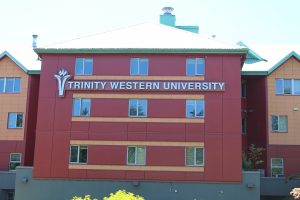
Is the TWU 2001 Case Dispositive?
The anti-TWU legal group argued that the 2001 decision of the Supreme Court of Canada had no precedential value in this current case. The BC Court agreed that it was not “dispositive” (that is to say, it does not settle the matter) because it dealt with the “downstream” effect of the Covenant. In 2001, the argument was that TWU graduates would discriminate in their teaching careers because of the discriminatory nature of TWU and its code of conduct. However, the Court said that the principles of that case “are highly relevant to the present case in that it involves balancing freedom of religion against the Law Society’s public interest.” Interesting to note is the fact that the Ontario Court of Appeal also held the same view of the 2001 case.
The principles from the 2001 case that were important to the BC Court of Appeal were:
- TWU’s admissions policy is not a breach of the Charter – it is not “unlawful discrimination” – but that does not mean there is no impact on LGBTQ individuals;
- Equality guarantees in the Charter and human rights legislation on sexual orientation is an important consideration;
- Religious freedom needs to be reviewed recognizing that what might appear good to the majority or the state may not be imposed on religious minorities;
- The context of private religious institutions must be considered in reconciling the rights;
- The impact of the administrative decision must be assessed on the basis of “concrete evidence” not conjecture – there was no specific harm in the 2001 case.
The BC Court rejected the argument that the 2001 case should not be considered because of the changes in the law since 2001. Rather, it noted that the essential legal analysis of the 2001 case has “not changed appreciably with respect to the obligation to balance statutory objectives and the Charter rights affected by an administrative decision.” Instead it was confirmed in both Doré and Loyola High School cases.
The Court accepted John B. Laskin’s analysis of the 2001 case and the more recent case of Whatcott that “the proper balance point between equality and freedom of religion values to be the point at which conduct linked to the exercise of freedom of religion resulted in actual harm. Absent evidence of actual harm, it held in both cases, freedom of religion values must be given effect.”
Balancing Exercise
So the appropriate approach to these matters, said the Court is to recognize:
- The starting premise cannot be that one right trumps another – Equality does not trump Religious freedom;
- Charter rights are to be balanced against the statutory objectives of the Law Society
- It is not enough to just consider the competing rights and choose one over the other. The Law Society has to consider the nature and degree of the detrimental impact of the statutory decision on the rights.
Impact on Religious Freedom
“[T]he detrimental impact of the Law Society’s decision on TWU’s right to religious freedom is severe.” TWU graduates would not be recognized and TWU’s religious freedom rights as an institution would be significantly impacted.
The Court rejected the Ontario Court of Appeal’s decision that said that TWU’s freedom of religion is not impacted because it could still open an unaccredited private law school. “Such a contention,” said the BC Court of Appeal, “fails to recognize that the main function of a faculty of law is to train lawyers.”
Impact on Sexual Orientation Equality Rights
Inequality of access to law school
In principle there is discrimination of LGBTQ students. They would either have to lie to apply and sacrifice deeply held aspects of their lives or face disciplinary action including expulsion. However, the impact must be considered in context and concretely. Therefore, the Court said the question to be asked was: “Is there any evidence that a TWU law school would impede access to law school and the legal profession for LGBTQ students?”
The Court looked to the Special Committee of the Federation which considered this question and found that the existence of TWU Law School “would not result in any fewer choices for LGBT students than they have currently. Indeed, an overall increase in law school places in Canada seems certain to expand the choices for all students.”
So to refuse TWU would not enhance accessibility to LGBTQ students. Further, given that the Law Society would recognize TWU if the Covenant were amended, the ambiance of the school would remain.The faculty would still not accept same-sex marriage. This led the Court to the view that “in reality very few LGBTQ students would wish to apply to study in such an environment, even without the Covenant.”
This is not a matter of separate but equal situation where a black minority was excluded from participating in the US. Rather, it is the TWU community that is the minority here. With the majority of Canadians accepting same-sex marriage, that majority must not “be allowed to subvert the rights of the minority TWU community to pursue its own values. Members of that community are entitled to establish a space in which to exercise their religious freedom.”
The Court says, yes there is, in principle, discrimination but the reality is there is very little impact on the ability of the LGBTQ community to access legal education. TWU’s proposal of 60 first year students of some 2,500 nationwide, with the same high standards of admission as other schools, will inevitably mean that some of TWUs students are diverted from other faculties. That allows more opportunities for all students.
Law Society Endorsement of the Covenant
From the beginning of this controversy the anti-TWU legal group posited the idea that if a law society accredits TWU it was endorsing the discriminatory views of TWU. Immediately that argument has problems. If that is the case than that would mean every time a public body grants a license then it would be presumed to have endorsed the licensee’s views.
In oral argument I informed the Court that in Canada we have over 80,000 registered charities. A rough estimate is that 50% or some 40,000 are religious. If we accept the premise of this argument that would mean every time that the Charities Directorate of CRA grants registered charitable status it is therefore endorsing the religious beliefs of that charity. If that is the case, I argued, then we have a serious problem.
It was gratifying to see that the BC Court of appeal rejected the argument that the Law Society is deemed to have endorsed TWU’s views. It was nonsensical from the start. However, it did gain traction in Ontario – truly amazing.
Consider what the Court said on these points. It is extremely well written and articulate:
[184] In a diverse and pluralistic society, this argument must be treated with considerable caution. If regulatory approval is to be denied based on the state’s fear of being seen to endorse the beliefs of the institution or individual seeking a license, permit or accreditation, no religious faculty of any kind could be approved. Licensing of religious care facilities and hospitals would also fall into question.
[185] State neutrality is essential in a secular, pluralistic society. Canadian society is made up of diverse communities with disparate beliefs that cannot and need not be reconciled. While the state must adopt laws on some matters of social policy with which religious and other communities and individuals may disagree (such as enacting legislation recognizing same-sex marriage), it does so in the context of making room for diverse communities to hold and act on their beliefs. This approach is evident in the Civil Marriage Act, S.C. 2005, c. 33 itself, which expressly recognizes that “it is not against the public interest to hold and publicly express diverse views on marriage”.
The BC Court also dealt with the Ontario Court of Appeal’s analysis that the Community Covenant “is deeply discriminatory, and it hurts.” The BC Court was not impressed with Ontario’s analysis. (Nor was I – as I expressed in a previous blog post.) A decision-maker must deal with the infringement of a Charter right not on the bases of feelings. Said the BC Court of Appeal,
“While there is no doubt that the Covenant’s refusal to accept LGBTQ expressions of sexuality is deeply offensive and hurtful to the LGBTQ community, and we do not in any way wish to minimize that effect, there is no Charter or other legal right to be free from views that offend and contradict an individual’s strongly held beliefs, absent the kind of “hate speech” described in Whatcott that could incite harm against others (see paras. 82, 89-90 and 111). Disagreement and discomfort with the views of others is unavoidable in a free and democratic society.”
That is the point of this entire exercise from the beginning. The anti-TWU legal group were so incensed that a religious university, adhering to the traditional definition of marriage, would have the audacity and chutzpah to apply for accreditation for a law school. How dare they? This indignation has been rampant.
However, the BC Court of Appeal was having none of it. It rightly pointed out “that the language of ‘offense and hurt’ is not helpful in balancing competing rights.” As the same can be said of the Benchers and members of the Law Society who called the evangelical Christian community’s view of marriage as “abhorrent”, “archaic” and “hypocritical”.
Indeed, I would add that the outcry against TWU in Canada’s legal profession has been deafening. Every common law school, law deans, and three law societies have chastised TWU for its alledged bigotry. The intolerance toward TWU in legal circles has at times been raw. Discussions at some law firms have been heated. Some long-term colleagues faced severe peer pressure for their support of TWU. It has not been easy. The animosity, I am told, in some circles has been intense. At one point during the Orlando gay bar massacre one legal academic drew a line to TWU – saying that TWU’s policies created a culture for such violence.
It is, therefore, long overdue to have a high court address this concept of offense. The Evangelical Christians in Canada have had enough innuendo and disparaging remarks from the legal professionals and legal academics for an entire generation. It is time for the legal community to understand that we are here – let’s get along the best we can without the rhetoric.

Conclusion
The court concluded that the TWU community has a right to hold and act on its beliefs, absent evidence of actual harm. The decision of the Law Society in not approving TWU was a denial of religious freedom. The impact on religious freedom was severe whereas if TWU were permitted to have its law school the impact on LGBTQ persons was minimal. Declaring TWU not to be an approved law faculty was unreasonable. There was only one reasonable answer.
The Court’s final paragraph is worth quoting in full. It will, I believe, become a classic in Canadian jurisprudence:
[193] A society that does not admit of and accommodate differences cannot be a free and democratic society — one in which its citizens are free to think, to disagree, to debate and to challenge the accepted view without fear of reprisal. This case demonstrates that a well-intentioned majority acting in the name of tolerance and liberalism, can, if unchecked, impose its views on the minority in a manner that is in itself intolerant and illiberal.
Final Thoughts
I think I am going to frame paragraph 193 and hang it in my office. As one who has argued for years in religious freedom cases in Canada this one is a sweet victory for the history books. In truth, this is what we all want – even the anti-TWU legal group. We all want to be in a free society where we can think – disagree – debate and to challenge one another without fear of reprisal. I agree with the Court that the anti-TWU legal group were well-intentioned. They want to end discrimination just as the rest of us. The problem, however, is that they wanted to eliminate all contrary views. That simply cannot be. We are a plural society with a long history of religious freedom. We are not monochromatic. We are diverse.
We need to have space enough in this country for many different understandings of what it means to obtain community. There are a plethora of religious groups in this country. Every day when I look out of my office window I watch the “horse and buggy people” go by. I am always amazed at the religious tradition of maintaining a way of life that is very different from my own. For generation after generation, these Old Order Mennonites continue to live life as they understand it must be lived. I do thank God that we are in a country where these differences can continue. And I am very thankful for our system of governance where we have a constitution that protects my religious freedom to live as I understand my obligation under the sight of God. Many disagree with me – which is more than fine as I disagree with many of their views, but we are all fellow sojourners on this planet – for the time being as long as we live. Canada is a mutual enterprise. We all need each other. We all need to protect our respective differences. It is not an “either” “or” but an “and.” You “and” me.
This articulate and substantive BC Court of Appeal decision allows us not only to believe in Canada as a liberal democracy worthy of the name but to see it so in action.
Where do we go from here?
It is now up to the Law Society of BC to decide if they will appeal. Given the importance of the case it is my thinking they will. The Ontario Court of Appeal decision has already been appealed by TWU to the Supreme Court. We have yet to hear from the SCC if they will hear it. Given this BCCA decision and the Nova Scotia Court of Appeal decision the SCC has no choice, in my view, but to hear it. There are now two very distinct positions on the law that must be decided by the Supreme Court of Canada.
We do hope for a very positive decision at the SCC that will bring this matter to an end.
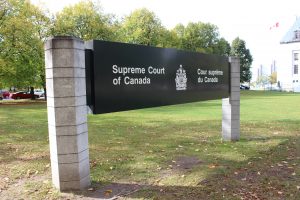


Awesome! Thanks for the great summary of this important issue from a Christian perspective. So important to protect religious freedom. There are enough examples that should be a sufficient warning to all of what can happen if one majority rules. ISIS, Marxism etc.
Thanks Bill. Indeed we have to recognize that religious freedom is a foundational right. Stay tuned because I plan to discuss this more in the future. Thank-you for your support! Barry
Wow. Amazing article. Amazing process. Amazing lawyers. Thank you Barry. Thank you lawyers. May your love of God and all humanity continue to shine.
Thanks Tyler. We certainly want to ensure that we are part of the solution not the problem. Keep us in your prayers! Blessings!
Good job- keep up the good work- nice to see lawyers making a positive impact on the rights for all of us- thank you
Thanks so much!
This is a good, detailed analysis, which I very much appreciate. Thank you! I don’t think we can understate the verbal and legal abuse which Trinity Western University and, Christians, in general, have suffered in Canada by certain law societies. I’ve said it once and I’ll say it again: “Since when is it bad to believe it’s good to have a mom and a dad?” One of the main teachings of Jesus is that marriage is monogamous, between a man and a woman, for a lifetime, and celibacy if single. This is basic Christianity. And, it’s good, ethical behavior! I can’t help asking a question. When will the law societies do the right thing, and apologize for beating up Christians, who are just trying to live good, peaceful lives?
Hi Trudy, Thanks for your comments. The point is we have to be respectful of those who disagree with us on these fundamental matters.
dear barry.. yes it is true ..the bible says man will come scoffing at all who except the bible and will become lovers of themselves..sex is a free for all where any combination type encounter is is taking place in the world.thiS is the difference between GODS people and the ungodly…JESUS said they will rise up against the LORDS remanent church and other christian churches.we must all continue to pray for GOD to extend the relegious liberty to us.tks for your hard work and service to the LORD on all our behalf .. sincerly douglas daigle college park member……….
Appreciate all the wonderful work you have done for religious liberty, and especially for TWU, and the excellent results so far. Thanks for the good communication. Our prayers are with you and all who do this work. Guess you came back to Canada for such a time as this. From Dave and Yvonne Crook
Hi Yvonne – thanks so very much for your kind words.
Great analysis on a troubling case. When one looks at the forces at work, especially on our university campuses, it’s imperative that we stand for true freedom which accepts diverse viewpoints and choice, without trying to extinguish a group that makes us uncomfortable. One look at what’s transpiring at the U of T is another example of this.
Thank you Pastor Rooney. You raise the example of Prof. Jordan Peterson at the U of T. This is very troubling. What is happening is that Prof. Peterson’s position is seen as insensitive because he does not accommodate those who do not want to be identified by the normative pronouns. They see themselves outside of the current paradigm. Thus Peterson’s refusal to accede is taken as a personal insult to their dignity. It is a rejection of them personally. As a result they are very angry. How then do you deal with this? You could say to the group, “Get over it! We have had this understanding for millennia you are not going to change it now.” However, that does not diminish the fact that these non-conformists have developed a sophisticated reality that is very different from the traditional worldview. How we are going to deal and unravel this web is going to take some time, if it is even possible! Thanks again for your thoughts. Barry
Thank you Barry for writing such an essential summary of the most important Canadian decision of our generation. As a relatively junior lawyer/litigator (2013 call), I have wanted to get involved in this matter but am unsure of where I would begin or how my colleagues would perceive my involvement. I will pray for your efforts and hope one day to support this essential battle, which is the Lord’s alone, and to see it through to victory in His name. God bless.
Hi Robert, Thanks for your comment. I very much appreciate your conundrum. There have been a number of lawyers who shared with me their hostile work environment when they informed their colleagues of their support of TWU. It is not an easy matter for many lawyers given the hostility in the profession against TWU.
We are always in need of legal counsel like yourself to become involved. I encourage you to contact Derek M. Ross, the Executive Director of CLF. (execdir@christianlegalfellowship.org) He will get you plugged in to whatever area you want to assist in.
Do keep in touch!